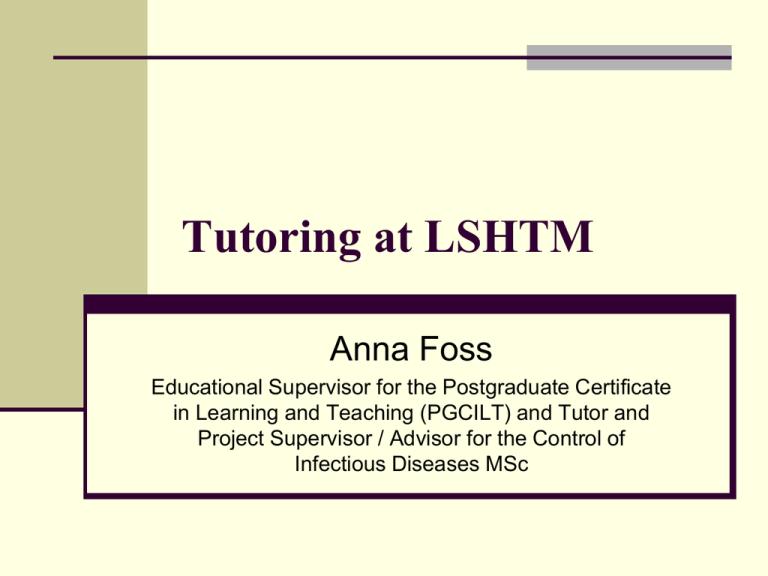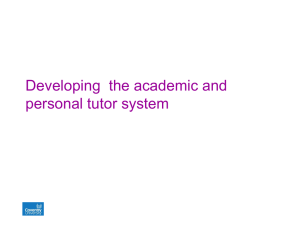Tutoring at LSHTM
advertisement

Tutoring at LSHTM Anna Foss Educational Supervisor for the Postgraduate Certificate in Learning and Teaching (PGCILT) and Tutor and Project Supervisor / Advisor for the Control of Infectious Diseases MSc Helpful reference document on intranet You are here: Home > Teaching Programme > Staff Resources Teaching Programme - Staff Resources Teaching Policies and Codes of Practice - covers Orientation, Tutorial Support, Module Design and Management, and Evaluation and Review: http://intra.lshtm.ac.uk/tpd/taughtcourses/staffr esources/tpols_cop_1_2_3_5.pdf Faculty of Public Health & Policy (PHP) PHP MScs PHP, through Taught Course Director (Hannah Babad), allocates Tutors to 4 MScs: 1. Health Policy, Planning & Financing (HPPF) 2. Public Health (PH) 3. Course Directors: Helen Hogan, Kiran Nanchahal, Jennifer Gosling, Wendy MacDowall Control of Infectious Diseases (CID) 4. Course Director: Neil Spicer Course Director for PHP: Anna Foss Public Health in Developing Countries (PHDC) Course Director for PHP: Tanya Marchant Policy 1. Each student allocated a personal Tutor to deal 2. 3. 4. 5. with academic matters and pastoral care If academic matters beyond scope of Tutor then Tutor to find another member of staff Where the personal relationship is clearly not working – first contact MSc Course Director Tutors to be familiar with School’s formal policies on tutoring Each Tutor must keep him/herself fully informed of the actions of PHP Teaching Committee, via MSc Course Committee and/or MSc Course Director Role of personal Tutor in PHP Tutor should make him/herself available to each tutee for one half-hour every fortnight in Term 1 and then once every 3 weeks Tutorial must be for tutee alone Responsibility of tutee to make regular appointments to see Tutor – but Tutors should follow-up on students who do not make contact Students may request additional meetings and these should be accommodated when appropriate If Tutors are absent for longer than two weeks they should delegate another Tutor Tasks of tutor The Tutor will where possible: provide guidance on choice of teaching modules report problems to Course Director be aware of problems with languages, literacy or numeracy offer advice on assessments offer help with examination skills approach staff for help and advice on behalf of tutee maintain awareness of mental & physical health of tutee and provide guidance if appropriate provide information regarding changes to course Tutorial Record Form Available from MSc Course Administrators Tutor responsible for ensuring form is completed and signed by Tutor and student Copy should be retained by Tutor Completed forms should be given to MSc Course Administrator each term Discussion via email with students should also be retained Key Skills Tutors have a particular duty to support their tutees in identifying and addressing any problems English for Academic Purposes (Lucy Allen) Basic Maths (Anna Foss) Student Advice & Counselling Service (Frankie Edwards / Emma Nabavian) Careers Office (careers@lshtm.ac.uk) Tutors may be expected to set and review a piece of written work during Term 1 Academic roles Supervising / advising / tutoring and marking MSc Projects Examination setting and marking for the June Exam Papers Attending teaching related Committees and events Not all roles required of all tutors - depends on MSc and level of experience It is recommended that staff only Tutor on one MSc to avoid duplication of allocated responsibilities Faculty of Infectious and Tropical Diseases (ITD) Taught Course Director: Graham Clark ITD: Term 1 Meetings: minimum - fortnightly (term one), about every three weeks thereafter (at least once in C, D and E slots) Ask tutee how they want to arrange this: regular fixed time during the week (weekly/fortnightly) tutor available at fixed time ad hoc - student to e-mail tutor to set up meeting Tutor to keep contact by periodic e-mail and meet if desired If initial meeting indicates language difficulties enquire if attending English for Academic Purposes classes Set an essay based on agreed topic to be handed in at fixed time before end of Term 1 Explain how projects are organised - see project handbook Meeting to discuss Term 2/3 module choices ITD (and PHP and EPH): Terms 2 and 3 “Struggling students” may be eligible for extra support (PASS) If requested, advise on Module assessments Monitor Module grades posted by TSO on U drive Advise / encourage completion of the project CARE form Offer to advise on organising revision for exams and to review attempts for structure / depth of content Regularly check on progress during the project and write-up period Be willing to act as referee on job / academic applications Main differences in ITD compared to PHP Tutor is rarely the supervisor on most MScs Way in which projects are found by / allocated to the student: Student discusses ideas with tutor who directs them to potential supervisors (internal or external) ITD send round list of potential projects and supervisors towards end of Term 1 Tutors often tutor on more than one MSc Tutors not expected to be involved in exams unless invited to be part of exam board or provide questions Limited use the tutor record form but tutors must keep email correspondence Faculty of Epidemiology and Population Health (EPH) Taught Course Director: Craig Higgins Main differences in EPH compared to PHP All the procedures / policies are the same in EPH as PHP except for: In EPH some but not many use the tutor record form – responsibility for this is left with tutor MSc courses vary slightly from each other in some of their practises such as whether tutors help students with past exam questions Once assigned to an MSc you will be informed of what is expected







